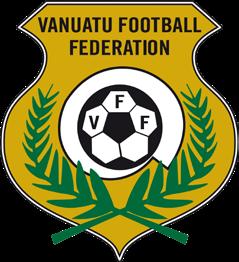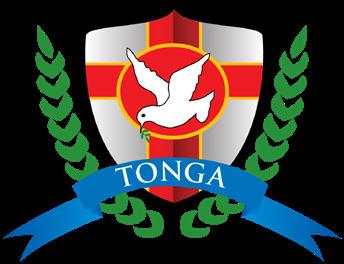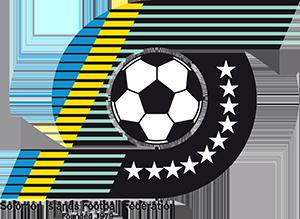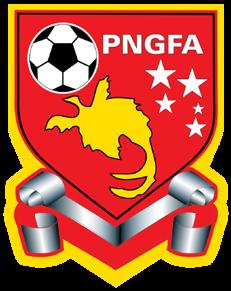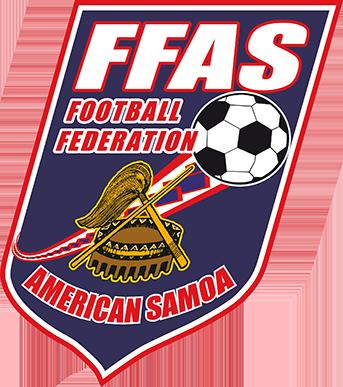






This year signified a time of strategic transformation for the Oceania Football Confederation (OFC). We entered 2022 focused on delivering a future strategy and I am pleased that this has been fully achieved.

The OFC Strategy 2023 – 2026 was launched with football at the heart this strategy, our ultimate dream of Qualifying two teams at the FIFA World Cup 2026 and 2027 still standing strong.
Our key strategic focus remains constant, our Member Associations, football development and professionalisation and with this we have identified three pillars of Development, Education and High Performance, where we will continue to foster OFC’s values of Excellence, Passion, Integrity, Empowerment and Diversity.
This year was also significant for the return of international competitions after two long years of disruptions caused by the pandemic. And now we have successfully hosted the FIFA World Cup – Oceania Qualifiers in Doha, the OFC Champions League in New Zealand, the OFC U-19 Championship in Tahiti and the OFC Women’s Nations Cup and OFC Futsal Cup in Fiji.
The 28th OFC Ordinary Congress was also hosted physically on 21 October for the first time in two years in Auckland. We had the greatest pleasure of hosting the FIFA President Gianni Infantino, FIFA Council Members, CONCACAF President Victor Montagliani and many other Confederation delegates and Member Association Presidents.
A milestone was also marked on this day as OFC signed a Memorandum of Understanding (MOU)with CONCACAF which will see our two-confederation work closely together for the further development of football in our respective regions. The MOU will include sharing of knowledge and experience in all areas related to football on and off the pitch.
We closed the day with the Inauguration of the OFC Home of Football Te Kahu o Kiwa, with many of our invited Congress guests present. And I’m deeply proud to have showcased to our wider football family that the long-awaited dream for a dedicated football hub in Oceania finally became a reality.
OFC cannot express enough how grateful we are to FIFA for putting their trust in us and to UEFA Assist for providing us with additional funding to complete this project.
The formation of an OFC Professional League was approved by the Executive Committee in November following FIFA President Gianni Infantino pledging FIFA’s support for the concept during the OFC 28th Congress in Auckland. This will be the leader of change in Oceania football and will revolutionise the game and place OFC in a new era of a professional confederation.
I give my thanks to FIFA and all of OFC’s partners: the New Zealand and Australian Governments, UEFA Assist, UEFA Foundation for Children, UNICEF, UN Women, Football Australia and Score Sportswear Limited for their confidence and support.
OFC remains deeply committed to our football, people, culture, and communities across Oceania.
Lambert Maltock OFC President


Our confederation’s values of Excellence, Passion, Integrity, Empowerment and Diversity were a strong foundation that drove key advancements in 2022.
Football finally returned to the region with the FIFA World Cup 2022 – Oceania Qualifiers hosted for the first time in history outside of the Pacific in Doha Qatar. Followed by the OFC Women’s Nations Cup (Fiji), OFC Champions League (NZ), OFC U-19 Championship (Tahiti) and OFC Futsal Cup (Fiji).
Ever evolving within OFC was strategic planning and innovation resulting in the OFC Strategy 2023 – 2026 being launched in July. The strategic framework was simple. Football and our Member Association’s remained at the heart of the strategy. We endeavoured to go above and beyond development to foster capability building and excellence on and off the pitch to ensure our long-term goal to qualify two teams at the FIFA World Cup 2026 & 2027 is met.
Important strides were made and the constant rallying for the formation of the OFC Professional League and discussions with fellow confederations, potential partners and FIFA finally paid off as the OFC Executive Committee approved this proposal in November. This elevates Oceania football to a huge platform and is a game changer for OFC – moving from amateur to professional. We continue to make aggressive advancements to professionalise our game.
FIFA have pledged their support in the formation of the OFC Professional League and as always continue to support our long-term vision.
Revamping our collaborative approach with our Member Associations; OFC hosted a General Secretary workshop last year to stamp our commitment in corporate management. This marks a significant step in pursuing our goal in professionalising football off the pitch.
After the historic launch of the ALL IN: OFC Women’s Football Strategy 2027 Women’s Football in Oceania took further strides with the introduction of the “This is how we football” campaign which debuted at the OFC Women’s Nations Cup 2022. Aimed at growing the women’s game by creating fun, accessible and safe environments for women and girls the programme focuses on empowering young women by improving their knowledge on safety, health, and wellbeing.
With the FIFA Women’s World Cup co-hosted in Australia and New Zealand next year in 2023, the OFC Legacy Programme was launched aiming at leveraging opportunities to bring women’s football to the forefront in the Pacific and open pathways to grow the game from grassroots to the elite levels.
OFC’s dedication to women’s football took another stride in 2022 with the unveiling of the Gender Equality Playbook, an indication of the first phase of the OFC Pacific Legacy Programme. It was aimed at accelerating the progress being made in the development of a more inclusive and equal sport across Oceania.
UEFA Assist played a key role in leading technology advancements by funding the supply of TV, livestreaming, and photography equipment alongside a capacity building workshop across all our 11 Member Associations. Indirectly securing the expansion and exposure of Oceania football across the regions.
We are grateful for the continued collaboration with our fellow confederations UEFA, AFC, CONCACAF, CAF and CONMEBOL.
And just as importantly, a big thank you to FIFA and to our partners: the New Zealand and Australian Governments, UEFA Assist, UEFA Foundation for Children, UN Women, UNICEF, Football Australia and Score Sportswear Limited for their confidence and support provided to OFC throughout the year.
In 2023 OFC will remain focused on our priorities of Development, Education and High Performance. We will consistently drive towards newer heights and keep setting the standards for the good of our game and all involved.
Franck Castillo General Secretary
CHIEF OF FOOTBALL REPORT
FOOTBALL DEVELOPMENT
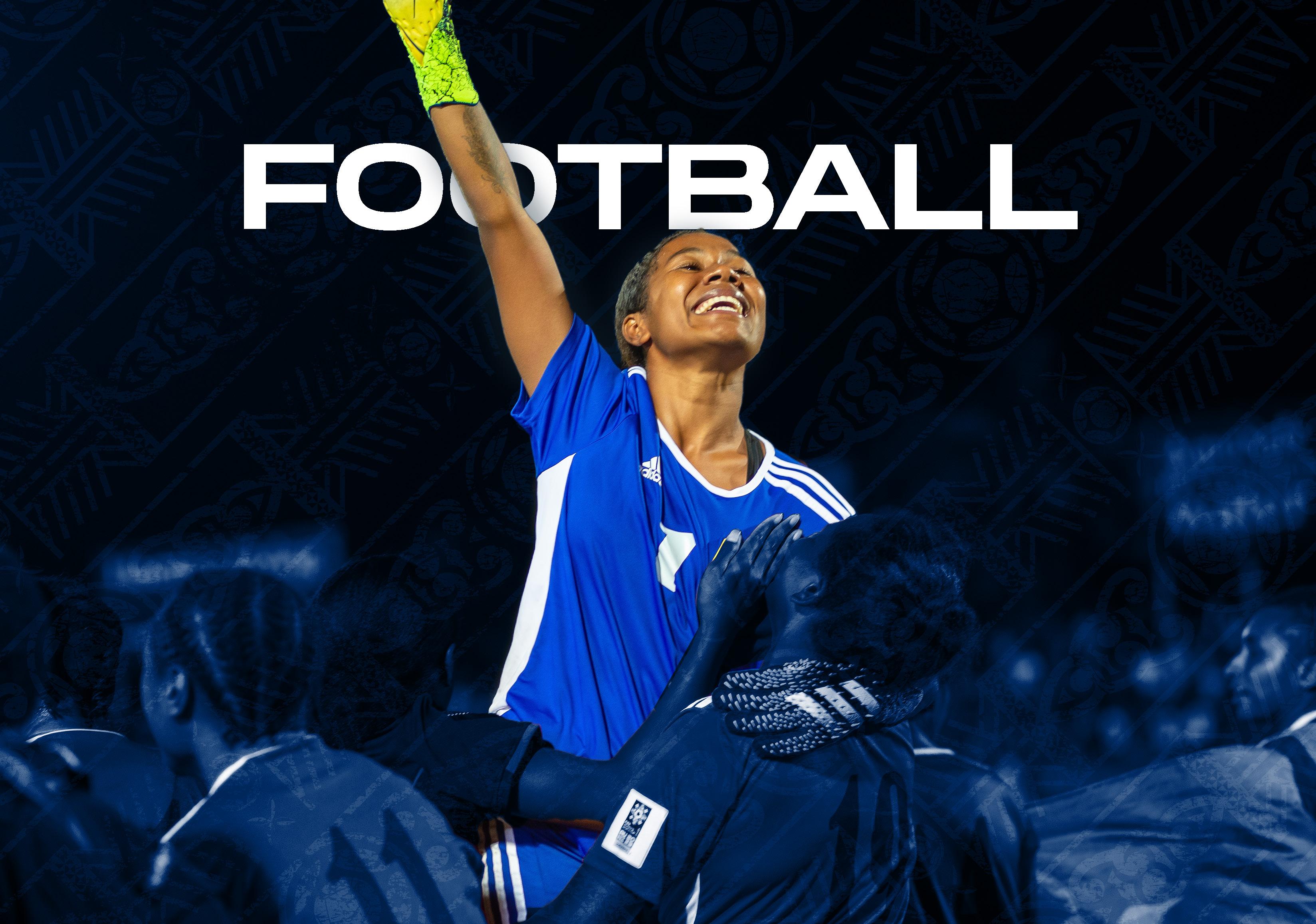
• WOMEN’S FOOTBALL
• PLAYER DEVELOPMENT
• GOALKEEPING
• FUTSAL
• BEACH SOCCER
CLUBS AND LEAGUES
EDUCATION
HIGH PERFORMANCE
REFEREEING SOCIAL RESPONSIBILITY
The Football Division played a crucial role in developing the strategic pillars for the OFC Strategy in 2022, this was clearly shaped and aligned with the OKR Framework outlined by the Member Associations Services Department.
The OFC Strategy 2023 – 2026 will not only have a momentous impact on professionalising football across the region and involving as many people in the game but will also act as a guide for the entire confederation to reach this common goal.
Breakthroughs continued to be made in women’s football after the launch of the OFC Women’s Football Strategy 2027. ‘This is how we football” campaign was launched at the OFC Women’s Nations Cup which aimed at growing participation, during the same month the OFC Women’s Conference took place which marked the first time since the pandemic the Women’s Football Development Officers across Oceania gathered.
A game changer in refereeing as 2022 also marked the year of success in developing female officials in the region as Oceania witnessed16 allfemale officials appointed to control matches at the OFC Women’s Nations Cup 2022 in Fiji.
OFC embarked on a new phase for the OFC Professional League, after a consolidated research, consultation and business case study was presented, the OFC Executive Committee approved plans to make further advancements of the professional league across the region.
A turning point for our online learning platform OFC Learn saw the expansion of its reach in football communities across the region and the world with the launch of the OFC Coaches Conference. This provided a unique opportunity for coaches from around the world to connect and learn from some of the world’s best football leaders.
For the first time in Oceania history, the OFC Pro-License coaching diploma was launched as OFC and the New Zealand Football Federation (NZF) partnered to deliver the global standard for elite level coaches. Since the introduction of OFC Learn, the Goalkeeper Licence courses and the OFC Coaches Conference, this is the next step in providing positive learning experiences for all coaches. We aim to develop competencies that are aligned with modern day coaching at the high level. As we continue to grow the game in Oceania, it is important that the coaching standards improve too.
I would like to thank my division for an excellent 2022 and for their continued effort of driving towards high performance both on and off the pitch.
As we look forward to 2023, our strategic goals remain to increase and improve representation and performance in international competition, foster capability building and to deliver positive experiences for all involved in the game.
Patrick Jacquemet Chief of Football
Following the launch of the ALL IN: OFC Women’s Football Strategy 2027 in 2021, last year saw a range of activities carried out in line with the strategy’s five key pillars of: An Equal Oceania, A Visible Oceania, A Stronger Oceania, An Elevated Oceania and An Inclusive Oceania.
An important platform for that was the OFC Women’s Nations Cup, held in Suva, Fiji in July 2022. Not only did the tournament give the nine competing Member Associations a chance to advance to the qualifying tournament for FIFA Women’s World Cup 2023™, but it also presented the first significant opportunity for the region’s female football leaders to gather in person since the scaling down of travel restrictions in Oceania.
The OFC Women’s Football Conference held in Fiji in the lead up to the tournament saw Development Officers from around the OFC’s Member Associations come together, with the conference held to coincide with the UN Women summit. Among a range of programmes run in cooperation with the OFC Social Responsibility Department, focussed on gender equality and ending gender-based violence. A training programme was run for female commentators as part of the ABC Women In News and Sport (WINS) initiative, with the goal of developing more female voices for the game in Oceania. On the field Papua New Guinea claimed their first ever OFC Women’s Nations Cup title.
With a view to breaking down barriers and striving for an equal Oceania, a C-Licence coaching course for women was held in Christchurch with 19 female coaches from eight Member Associations taking part. The announcement of the first ever OFC Women’s Champions League is a significant one for football at club level, offering an invaluable opportunity for players, coaches, and officials to develop and compete alongside the best of their regional peers, while bringing women’s competition further in line with the Oceania men’s calendar.
Twenty Women’s Development Officers from seven Member Associations became qualified OFC Women’s Football Educators after completing the organisation’s Train the Trainer Programme earlier this year. The Train the Trainer Programme aimed to teach the Women’s Development Officers how to deliver OFC’s Women’s Football Capacity Building Programme in their local communities. Six 90-minute online workshops were held over six weeks, focusing on three modules; life skills, leadership skills and work skills, which were broken down into prepare and apply phase activities.
The focus for 2023 will be working with Member Associations to expand the Women’s National Leagues and Women’s Youth Leagues which is a significant to retaining and increasing participation in the women’s game as part of OFC’s commitment to the strategy.
20 Women’s Development Officers from 7 MAs became qualified OFC Women’s Football Educators

11 Women’s Football Development Officers attended a Conference in Fiji

In 2022 the Player Development arm of OFC piloted a new-look Grassroots Football Festival, run in conjunction with strategic partners New Zealand Football, Māori Football Aotearoa, Northern Region Football and Kaikohe AFC in New Zealand’s far north. As part of the OFC’s Football Development strategic plan, the co-designed festival was tailored to suit local people and used to help develop a blueprint for Member Associations and communities to follow.
It was designed to co-exist with the current OFC Grassroots Football Festivals, which incorporates social messaging, such as Health and Wash, through OFC Just Play.
Later in the year the OFC Player Development team travelled to Tonga to hold a workshop attended by 20 local grassroots coaches, which also presented an opportunity for the OFC to examine the grassroots environment, complete assessments about the needs of the coaching staff and connect with those in charge of the grassroots and youth football area. OFC aims to develop key skills in players between the ages of 8-12, encouraging them to execute the action rather than think about the tactics of the game.
At Member Association level, and with support from OFC, Fiji launched their first grassroots youth football development curriculum, called Totolo Futupolo. The 231-page document is a blueprint for future football development programmes with different guidelines on planning, playing principles, coaching and a range of training exercises. It also promotes high performance for coaches and players of every age, gender and competency. At the conclusion of the formal events, a Just Play Grassroots Football Festival was held in Ba which saw over 400 kids, parents and staff attend including the OFC Football Development team.
In addition, Member Associations were able to strengthen their Grassroots and Youth football activities via the OFC Football Development Programme. Successful applicants were able to receive up to $65,000 across the two categories of football. These funds could be applied to tailor-made activities such as festivals and tournaments, as well as staff salaries, equipment and/or programme costs.
Player development’s goal in 2023 is to continue to consolidate and grow grassroots and youth participation in festivals, tournaments and leagues and encourage regular training programmes for young players across the region.
11 Player Development Officers
10

MAs operated Grassroots Football Festivals programme

Launched comprehensive national curriculum with the foundation of the cultural context.
Three Goalkeeping C-Licence courses, held jointly by the OFC and New Zealand Football (NZF) in 2022 saw the next generation of coaches in the Oceania region develop a deeper understanding of the position. Participants took part in pre-course online modules, in course practical and theoretical learning before leading their own sessions at the end of the course.
One of the courses was held in Mt Maunganui, New Zealand. Participants took part in pre-course online modules, in course practical and theoretical learning before leading their own sessions at the end of the course.
Candidates from American Samoa, Samoa, Solomon Islands, Tonga and Vanuatu joined others from across New Zealand on the course. OFC Goalkeeping Development Officer assisted on the course while participants also bonded over early morning swims and social events during their time in New Zealand. The other courses were held in Auckland in May and in Dunedin in December.
The C License marks the first step of the advanced coaching pathway for all coaches.
In 2023 the next step in the coaching pathway will be the staging of the Goalkeeping OFC/NZF B Licence.
Member Associations with a Goalkeeping operational plan and calendar were also able to strengthen their Goalkeeping programme via the $20,000 available through the Football Development Programme.
25 Goalkeeping Schools in 9 MAs
FIRST OFC
GOALKEEPING
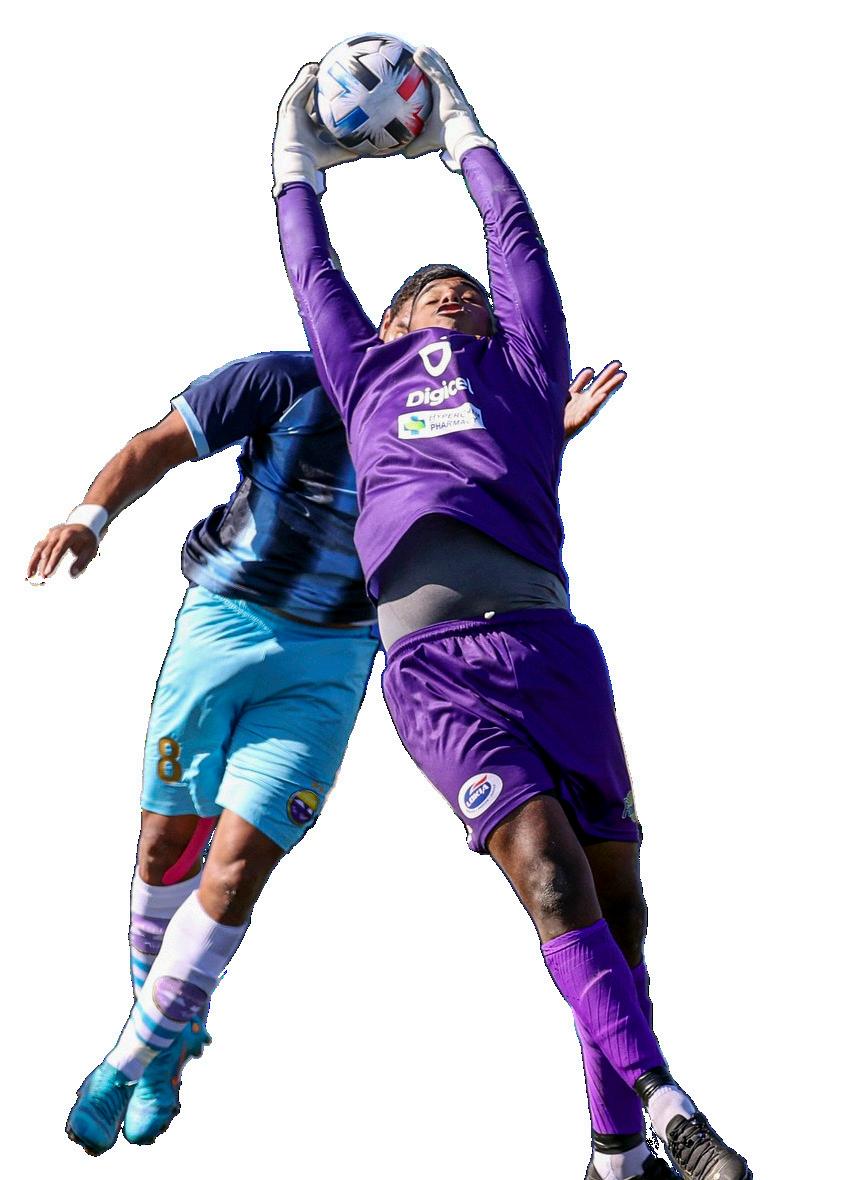
LICENCES delivered to 7 MAs utilising the new OFC Learn platform.

The inaugural OFC Futsal Cup in September 2022 marked the return of inter-regional futsal competition for the first time since the start of the pandemic, with seven Member Associations taking part in the tournament held in Suva (Fiji Football Association entered two sides). New Zealand emerged victorious after beating Solomon Islands in the final, with the tournament showcasing the continued development in futsal of Member Associations such as Samoa, Vanuatu and Tonga.
The OFC Futsal Cup was a key initiative to help teams prepare for the OFC Futsal Nations Cup which will take place in New Zealand in October 2023 and determine the Oceania representative for the FIFA Futsal World Cup™ in 2024.
At Member Association level, efforts to continue to elevate futsal coaching and officiating - areas integral to the overall growth of the game - continued through the hosting of FIFA Futsal Courses, OFC Senior Futsal C License courses, MA Futsal Certificate courses, FIFA Futsal Referee Courses and OFC Futsal Referee Courses.
In Tonga 25 local referees had the opportunity to upskill at their latest FIFA MA Futsal Referees Course, the first-ever conducted in-person by a FIFA Futsal Referees Instructor in the Kingdom.
As at the end of 2022, 27 coaches had gained their OFC Senior Futsal C License qualification over the past five years – a special achievement considering the ongoing border restrictions in the region recently caused by COVID-19.
Domestic competitions continued to grow, with national men’s competitions in Fiji, New Caledonia, New Zealand, Tonga and Fiji Solomon Islands and national women’s competitions in New Zealand. Despite the challenges posed by the pandemic, youth tournaments have become an increasing priority for Member Associations, with competitions such as the International Junior Futsal Cup in Honiara conducted in late 2022 in the newly constructed multi-purpose sports hall, with over 200 players from the Solomon Islands and Australia taking part.
The next step in 2023 will be expanding the National Futsal competition in at least six Member Associations for men and four for women’s competitions and to ensure a minimum of eight teams are participating in OFC Futsal tournaments.


At Member Association level strides continued to be made, with the Fiji Football Association hosting their first Digicel Beach Soccer Championship. There are plans to establish purpose-built Beach Soccer pitches in Suva, Ba and Labasa.
Coaching courses continued to be a point of focus in the development of the game, with FIFA Beach Soccer Coaching Courses in Samoa and Tonga, giving participants an education in the game from both a theoretical and practical angle.
Tonga continued to build their beach soccer competitions programme with leagues for men and women and plans for a new beach soccer pitch in Ha’apai, while New Zealand, Tahiti and Vanuatu also provided opportunities for grassroots and participation-level players to participate in beach soccer. In Tahiti, over 350 boys and girls from nine clubs across three age-grades (U-11, U-15 and U-18) took part in a beach soccer tournament that also included a quiz on Tahitian culture and football.
Member associations with a long-term focus on Futsal and/or Beach Soccer also made use of the $30,000NZD available through the OFC Football Development Programme to enhance their 2022 activities, by utilising funds for new staff, equipment, or the establishment of new tournaments and leagues.
OFC will work towards ensuring there are established Beach Soccer competitions in four Member Associations for women and six for men and will continue to drive the game to newer levels. The strengthen of local competitions is a key element in ensuring a competitive OFC Beach Soccer Nations Cup in August 2023.
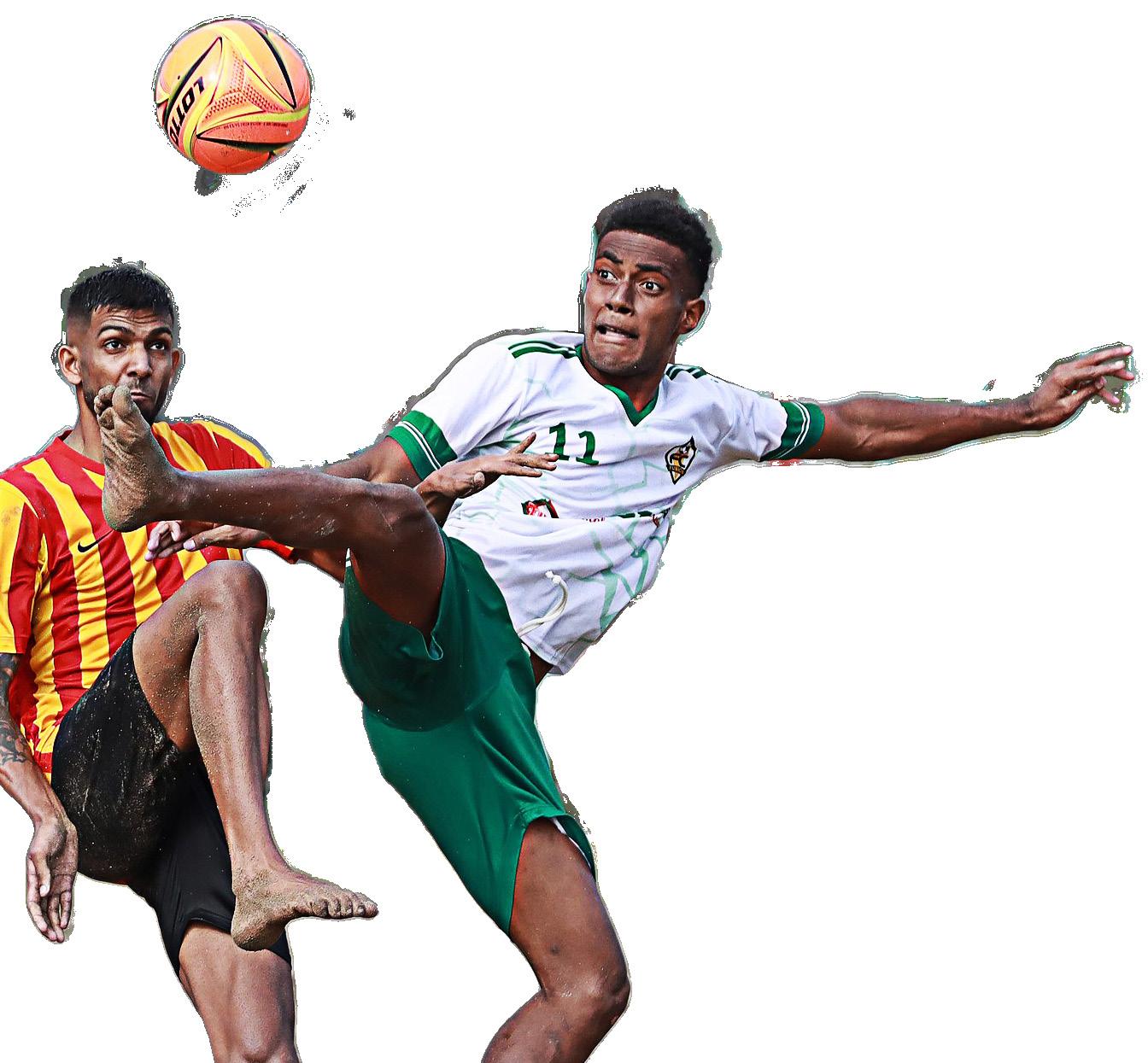
established in Fiji

GRASSROOTS BEACH SOCCER FESTIVALS
in New Zealand, Tahiti and Vanuatu
After a lengthy period of research, consultation, and a business study, which included harnessing advice and data from football organisations and experts around the world, a taskforce formed in 2019 presented to the OFC Executive Committee on the viability of a professional league in the Oceania region. Following analysis of the findings, the OFC Executive Committee confirmed in November 2022 that OFC would advance with plans to form a professional league in Oceania for the first time.
The decision marks a significant moment in efforts towards elevating standards across the region and increasing professionalism across all areas at Member Association level, while the advent of the pro league, which is slated to kick off in 2025, will also be vital to the OFC’s long-term goal of qualifying two sides to the FIFA World Cups in 2026-2027, with support for the idea coming from FIFA President Mr Gianni Infantino during the OFC Congress in Auckland.
At national domestic level, with the intention of improving and evolving men’s and women’s national leagues across the country, the Clubs and Leagues team held online capacity building workshops for Member Association clubs throughout the year with a focus on upskilling the club-based football community in a number of administration and off-field areas.
On the Club Licensing front, OFC continued to host online Introduction to Club Management and an extensive webinar highlighting the recently launched FIFA Guide to Club Licensing in Women’s Football, made available through the OFC Learn online platform.
The new year will focus on expansion of more players and coaches from across the region enrolled in Professional Clubs and reinforcing club licensing within Member Associations.
100
Attendees from 11 MAs and around the world participated OFC Club Development Workshops

gained approval from the OFC Executive Committee to proceed following work from the OFC Pro League Taskforce

After being launched in the final quarter of 2021, 2022 saw the OFC Learn online education platform expand its reach and offering to football communities around the world. This included hosting the flagship OFC Coaches Conference 2022, which brought together some of the world’s most prominent football leaders in a forum which offered coaches a unique opportunity to connect and learn from the best. Among the speakers was Arsenal legend turned FIFA Chief of Global Football Development Arsène Wenger, Canada national women’s head coach Beverly Priestman, High Performance Coach Owen Eastwood and Fulham Football Club Head of Academy Coaching Ben Bartlett.
The topics included Youth Player Development, Lessons on Leadership, Integration of outfield players in Goalkeeping Coaching and Physical Preparation of Female Players. Additionally, coaches gained access to a range of other resources available through OFC Learn.
In December the OFC announced it had partnered with New Zealand Football to deliver the first Pro Licence coaching diploma in Oceania, which is the global standard for elite level coaches and a requirement to coach in many of the top leagues around the world. The diploma aims to develop competencies that are aligned with modern day coaching at the highest level. The Pro Licence course will be delivered across three regions in New Zealand through 2023.
An outstanding number of 5,534 participants across 11 Member Associations attended courses as part of the OFC Education Centre in 2022, This included coaching across grassroots, youth, senior, beach soccer and futsal and included both certificate and license courses.
2023 will focus on two crucial pillars within the OFC Strategy: Education and Development. This means establishment of the Goalkeeping B Licence course and integration of learning modules for off the field areas such as marketing, finance and media within OFC Learn. Furthermore, the focus is also to have all Member Associations involved in the OFC Education Centre and increasing Oceania’s pool of coach educators.
5534 People attended formal courses as part of the OFC Education Centre
2579 Registered users on OFC Learn

33 New Coach Educators enlisted as part of OFC Coach Educator Programme, with females making 33% of the group
22% Of OFC Education course attendees were female, an increase on previous years

Mid-year saw an opportunity for four Technical Directors from the Oceania region to participate in the FIFA Standard Course for OFC and CAF in Cairo, Egypt, with Tahiri Elikana (Cook Islands), Timo Jankowski (Fiji), Paul Isorua (Papua New Guinea) and Moses Toata (Solomon Islands) spending three days in theory-based sessions learning more about the role and responsibilities of a Technical Director. The course was split into eight chapters including an introduction to growing professionally, the position of a Technical Director within an MA, technical department setup and football environments analysis with a focus on group collaborative activities and personal reflection.
The FIFA World Cup – Oceania Qualifiers in Qatar, OFC Women’s Nations Cup 2022 in Fiji and OFC U-19 Championship in Tahiti presented the opportunity for Member Association staff to spend three weeks working as part of the Technical Study Group. Led by the OFC Education and High Performance team, the group of participants were allocated teams to observe throughout the tournament and given opportunities to develop their skills across different areas of match analysis and filming.
Support and funding were provided through the OFC National Academy Programme to 5 Member Associations: Fiji Football Federation, Fédération Tahitienne de football, Fédération Calédonienne de Football and New Zealand Football Federation. The OFC National Academy Programme identifies talented and potential players through youth football programmes and provides training programmes. As part of the confederation wide strategy, an emphasis on National Playing and Coaching Philosophy across Member Associations and ensuring National Men’s and Women’s Teams play at least three matches will be the goal for 2023.
5 MAs supported through the OFC National Academy Programme
9 MAs received OFC National Teams Funding
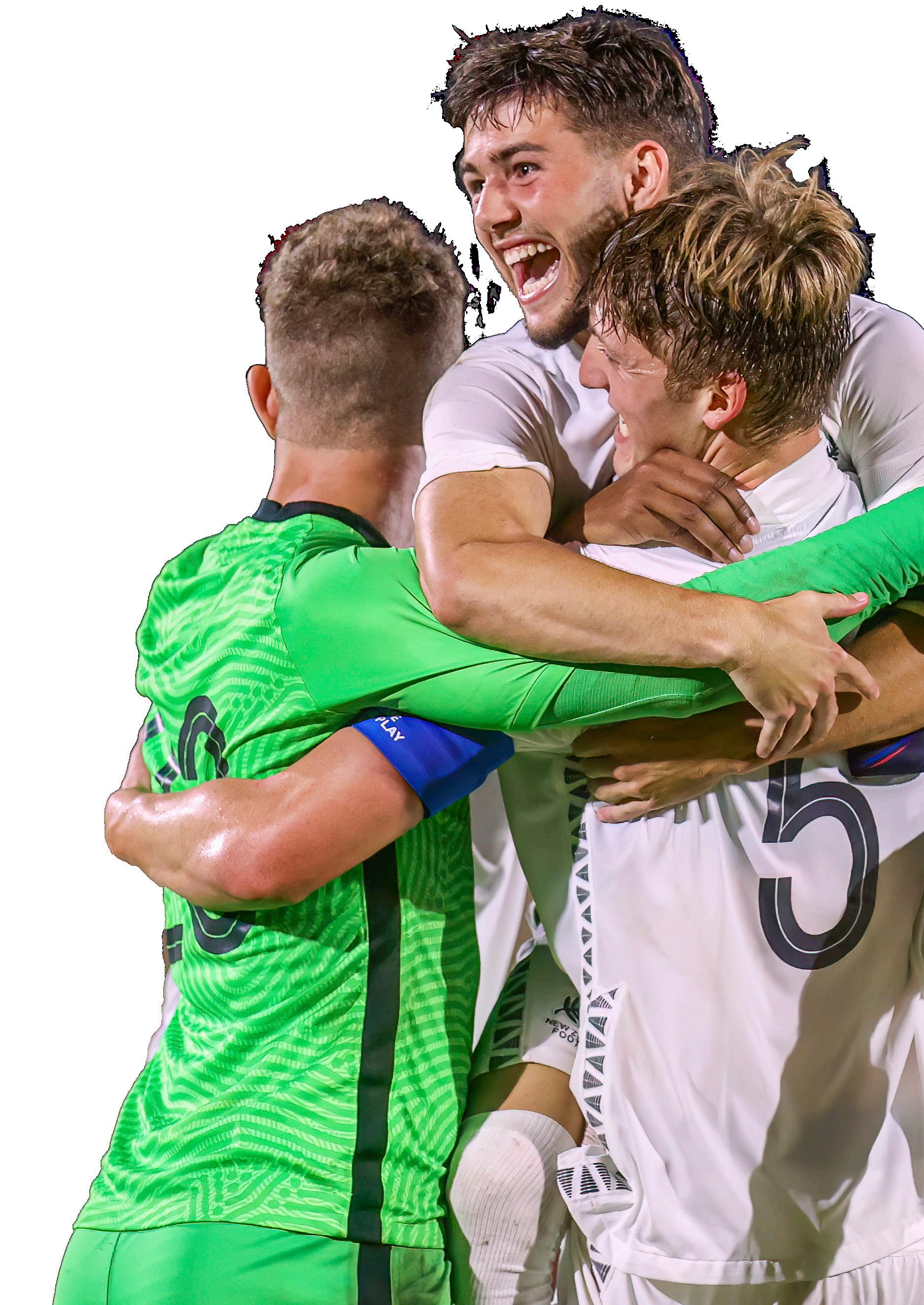
delivered across 3 National Team Tournaments in Canberra, with Solomon Islands, Fiji and Papua New Guinea taking part

After a long period, which saw many Oceania match officials unable to take part in matches outside of their own country due to travel restrictions associated with the pandemic, business began to return to normal in 2022 as a host of major competitions returned and the opportunity to travel for other upskilling opportunities returned. The opportunity for 16 match officials from eight different OFC Member Associations to travel to Qatar in March last year for the Oceania Qualifiers was significant, presenting the opportunity to not only officiate in a new environment, but to work alongside and share knowledge with a group of local Qatari officials.
In a powerful show of the effort and results which have gone into developing female officials in the region a couple of months later when a 16-strong, all-female group was selected to control matches at the OFC Women’s Nations Cup 2022 in Suva, Fiji.
The region’s leading futsal officials also had a long-awaited return to action when they took part in the OFC Futsal Cup in September.
Numerous online sessions as part of the OFC Academy were organised which hosted quality presenters and presentations that has set a benchmark for the academy participants. The success of the programme was due largely to the commitment of the OFC instructors and the OFC Academy nominees who attended online session which resulted in 11 officials appointed to OFC Competitions.
In November 2022, 14 Oceania match officials accompanied the OFC Head of Refereeing to Sydney for a Video Assistant Referee (VAR) facilitated by Football Australia. As the only confederation currently without VAR being used in club or inter-regional competitions, the trip was vital for Oceania match officials as they look to gain opportunities on the world
stage. The impending introduction of a professional competition for the Oceania region also means it is imperative that match officials from the region continue to remain educated in VAR and emerging technology which relates to match officiating.
The Refereeing in Schools Programme was introduced in American Samoa, Cook Islands, Fiji, Papua New Guinea and Tonga. These Member Associations have worked with their respective Education departments to incorporate this programme into their school curriculum. This will provide students, teachers and parents with a better understanding of the Laws of the Game and is an excellent opportunity that will provide a pathway for young officials.
On the world stage New Zealand’s Matthew Conger was one of 36 referees selected to officiate at the FIFA World Cup Qatar 2022™ and was joined in Qatar by fellow countryman Mark Rule and Tonga’s Tevita Makasini, who were selected as assistant referees, taking the Oceania representation at the world’s premier event to three.
Earlier in the year at the FIFA U-20 Women’s World Cup Costa Rica 2022™, New Zealanders Sarah Jones and Anna-Marie Keighley, along with Samoa’s Maria Salamasina, represented Oceania, after all three had earlier controlled matches at the OFC Women’s Nations Cup 2022.
2023 will be focused on developing the next level of OFC Officials with priority on technical mental and health fitness and increasing the number of female participants in each of the Member Associations. The aim is to also to elevate the level of Fitness Instructors across the region by targeting specific Member Associations to implement organised and structured Fitness Training for their match officials.
Officials (Fiji, New Caledonia, New Zealand, Papua New Guinea, Samoa, Solomon Islands and Tonga) attended a 4-day VAR Seminar in Sydney
REFEREEING IN SCHOOLS PROGRAMME

14 Female officials appointed to the Women’s Nations Cup in Fiji as a testament to the success of the OFC Academy
5
4
Male officials appointed to the OFC U19 Championship in Tahiti
5

Countries: American Samoa, Cook Islands, Fiji, PNG and Tonga have introduced the Refereeing in School Programme into their schools.
2
Male officials appointed as reserve officials for the OFC Champions League in Auckland
As momentum continued to build ahead of the FIFA Women’s World Cup Australia & New Zealand 2023™, a number of new initiatives were launched to advance its commitment to delivering gender equality and efforts to stop violence against women in and through football in the region. By capitalising on the momentum created by the region co-hosting the flagship women’s tournament, and by working with partners, such as the New Zealand Ministry of Foreign Affairs and Trade (MFAT), OFC is working to advance the positive and long-lasting impact of the tournament on gender equality.
This was designed to ensure the hosting of the FIFA Women’s World Cup in Australia and New Zealand leaves a lasting impact across our region both on and off the pitch. The Pacific Legacy Programme will include:
• Delivery of a Pacific Women in Sport Media programme focussed on game commentary and journalism around the FIFA Women’s World Cup
• Delivery of the Women’s Capacity Building and Women’s Leadership programmes and a closer collaboration between Social Responsibility and Women’s Football
• Tournament Activations both in the Pacific and at Host Cities
• Delivery of competitions safeguarding capacity building programme linked to OFC events and the FIFA Women’s World Cup
OFC continues to place significance on safeguarding everyone involved in our sport. In 2022 there were significant milestones to ensuring this happens at all levels of football with the establishment of the OFC Safeguarding Working Group and on-going support to review and develop OFC and our MA’s policies and procedures.


In November 2022, OFC Launched the Gender Equality Playbook thanks to the support of UN Women, the New Zealand Ministry of Foreign Affairs and Trade, and UEFA Foundation for Children. The Playbook is based on extensive research carried out in 2022 to understand the barriers to growing the women’s game and ensuring football is a positive agent for change toward greater social equality. Research included:
• Survey of 1,621 children across 25 Pacific Island Communities
• 110 interviews and surveys with women leaders in Football across Oceania
• Analysis of 1,887 sport media articles from Fiji, Samoa, Solomon Islands and OFC channels
The Gender Equality Playbook launch was attended by 100 representatives from across the Pacific and global sport systems and included key stakeholders such as ONOC, the IOC, National Sport federations and new partners such as UN Women, Laureus Sport for Good.
delivered to respond to Gender Based Violence for all team liaison officers and referees at the Women’s Nations Cup in Fiji
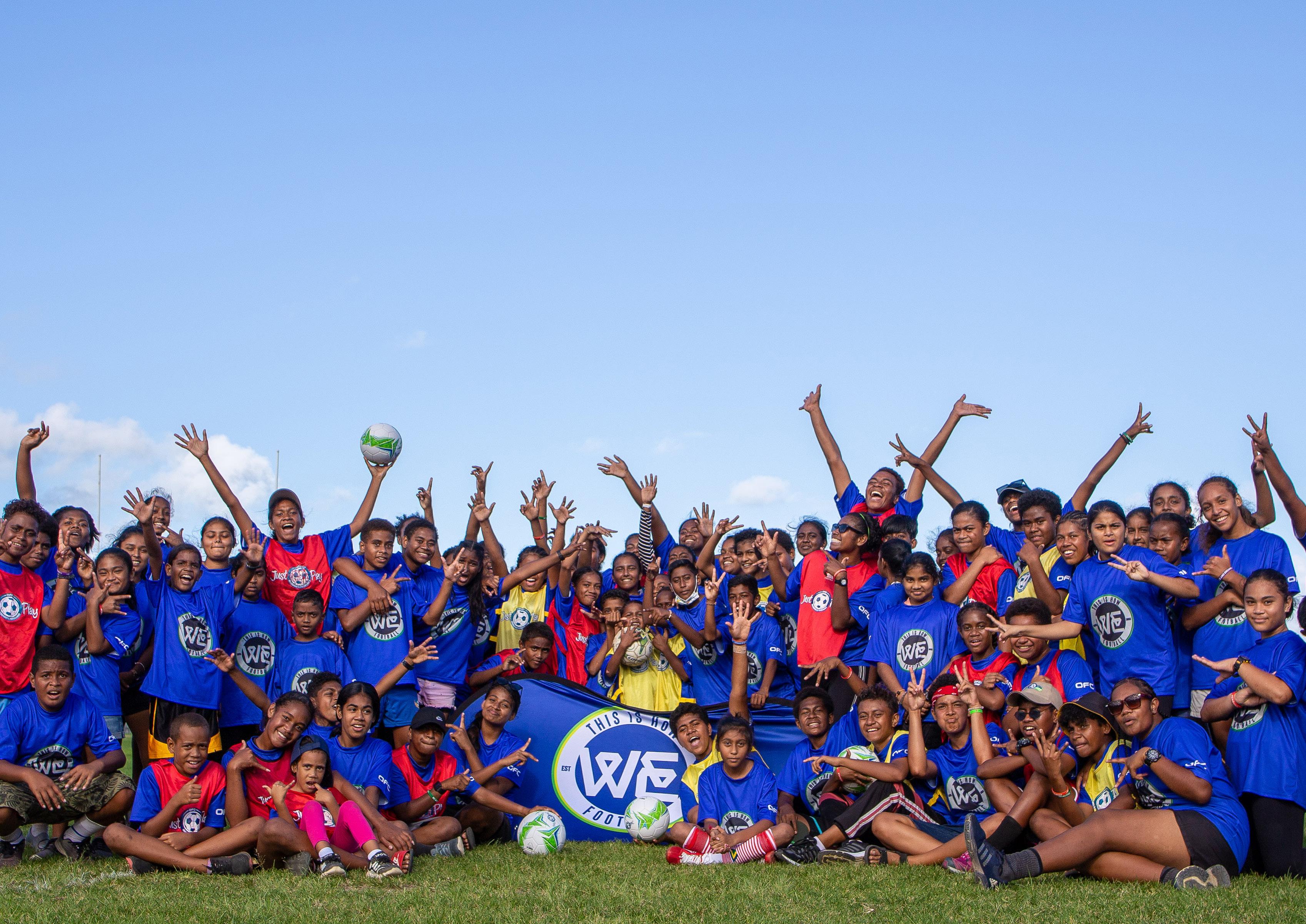
Piloted at the Women’s Nations Cup in Fiji.
delivered for International Women’s Day and International Day for Elimination of Violence Against Women
INTERNATIONAL WORKING GROUP FOR WOMEN AND SPORT (IWG) WORLD CONFERENCE
attended by all Social Responsibilty Managers in Auckland, November 2022
“THIS IS HOW WE FOOTBALL”
While COVID 19 has caused challenges during this reporting period, there have been some significant achievements in programme development and sustainability. This has included recruitment and training of new programme staff, development of new partnerships and strengthening ties with the broader football technical department in our Member Associations to mainstream social impact and enhance our reach of Just Play Plus programming in alignment with our impact areas.
The priorities for the new year will focus on the Just Play programme ensuring Member Associations retain and increase participation in all categories of football as aligned with the OFC Strategy. As well continued momentum on operations plans for the Gender Equality Playbook, Safeguarding and Women’s World Cup Pacific Legacy Programme.
• Review of the programme logic framework and refinement of programme curriculum based on findings from the 2021 Knowledge, Attitudes and Practices Study and including findings from Gender Equality Playbook in development of new Gender Equality Curriculum
• Delivery of Wellbeing and Resilience Training for TFA Staff and subsequent delivery of the Just Play Emergency Response Programme reaching 5,050 children following the 2022 Tsunami, Earthquake and COVID 19 lockdowns including delivery in the outer islands of Eua and Vava’u.
27K

Children reached in the Pacific despite the disruptions caused by Covid in 2022
relaunched and hired a National Programme Manager
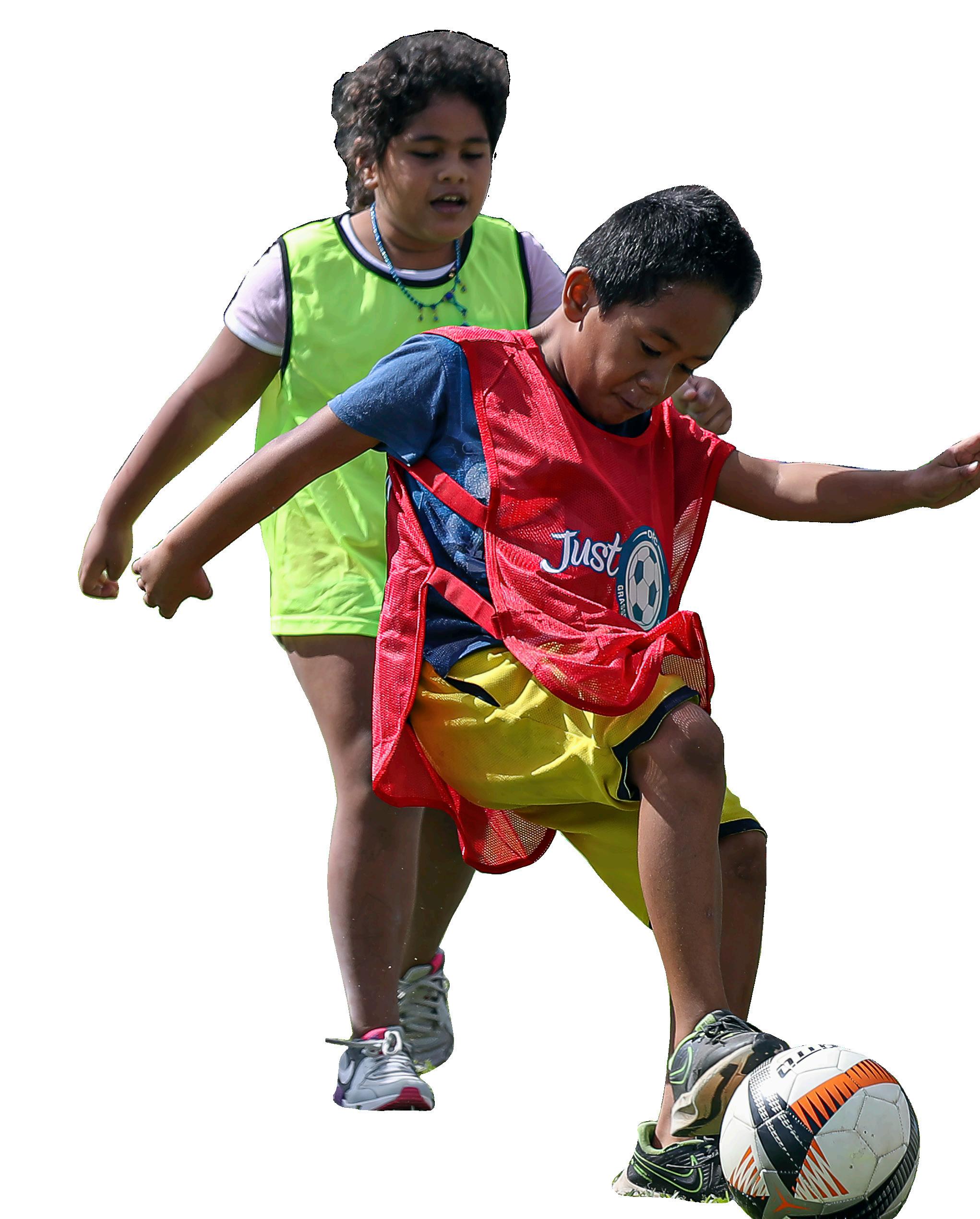
CHIEF OPERATING OFFICER’S REPORT
COMPETITIONS
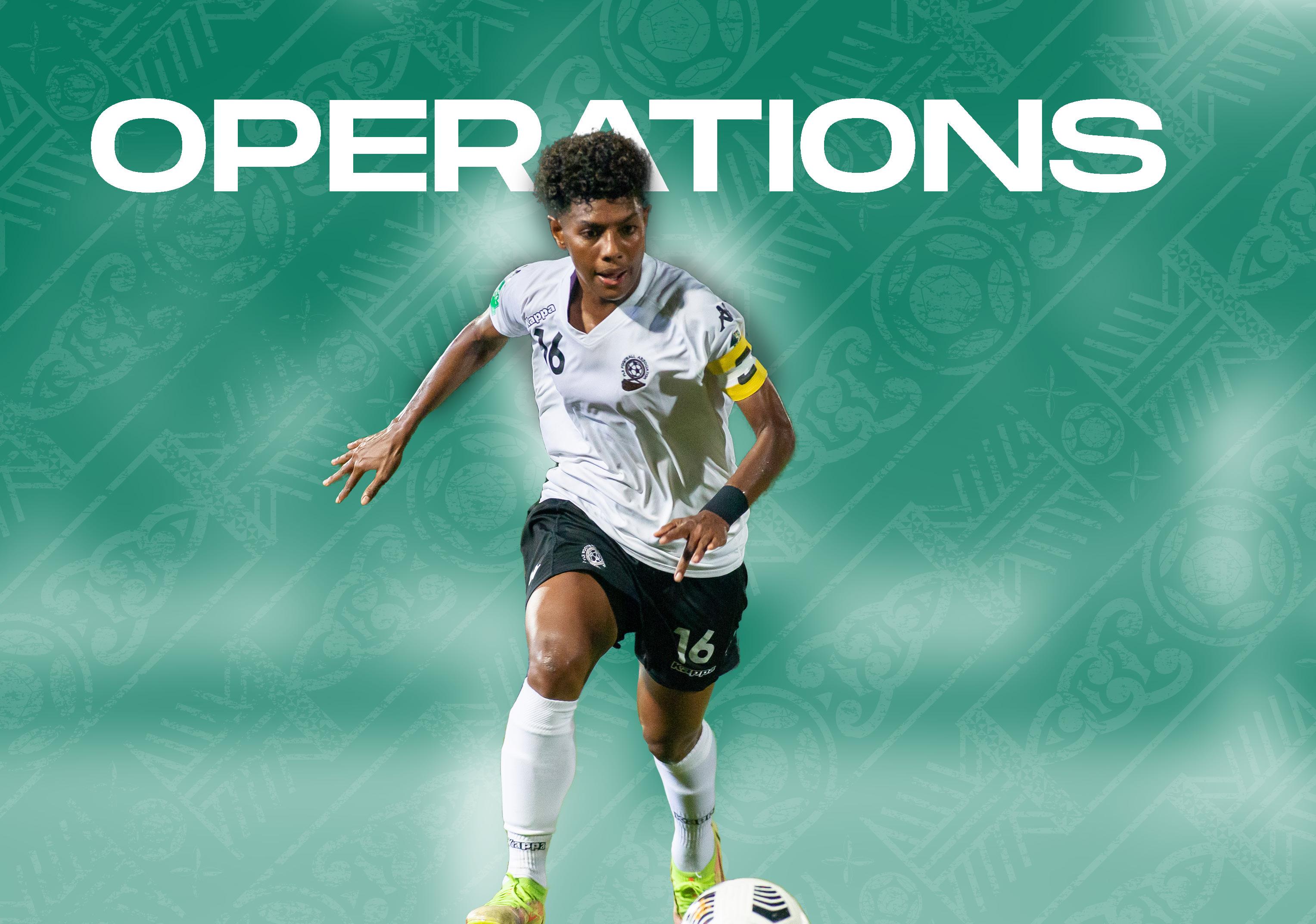
COMMERCIAL AND COMMUNICATIONS
FINANCE AND SERVICES
MEMBER ASSOCIATION SERVICES
Devoted to building a strategic framework in 2022 the Operations division concentrated on cementing key strategic outcomes for 2023 through to 2026, off the back of last year where leading innovative advancements was the focus.
Effectively the foundations of the OFC Strategy were moulded by evolving the Objectives and Key Results (OKR) Framework, radically transforming a traditional strategic approach to an advanced method that aligned our core purpose, values, core pillars which crafted OFC’s top goals and strategic key results.
As part of the confederation’s strategic pillar ‘Education’ we committed to expanding learning modules to include corporate governance under OFC Learn and set an ambitious goal to deliver certificates in Football, Competitions, Marketing and Financial Management.
The competition year started off strong with the FIFA World Cup 2022™ - Oceania Qualifiers hosted in Doha Qatar, a testament to our development in strategic planning as for the first time ever OFC hosted a tournament outside the Oceania region due to on-going border restrictions.
Following the Oceania Qualifiers, four other competitions were successfully completed: the OFC Women’s Nations Cup, OFC Champions League, OFC U-19 Championship and OFC Futsal Cup.
All-time records were broken in the history of the Women’s game with over 5,000 fans attending the OFC Women’s Nations Cup final between Papua New Guinea and Fiji at the HFC Bank Stadium in Suva Fiji with an impressive 42,000 live-streaming views.
The OFC Champions League hosted at Ngahue Reserve, the OFC Home Football saw the operational division really band together to organise and host this premium flagship competition which took place just a week after the Women’s Nations Cup. The organisational committee for the first-time involved Finance and Services who ensured the successful delivery of this event.
A breakthrough was made in our Commercial Strategy from the sale of media rights for OFC’s premium competitions, generating an income from broadcast revenue for the first time in OFC history.
A huge win was securing funding from UEFA Assist for the supply of TV, livestreaming and photography equipment to all 11 Member Associations. Our goal was not only to provide the resources for success but to equip our people with skills to use these resources and so OFC in partnership with UEFA Assist hosted a workshop in Fiji to upskill and expand Media Officer knowledge in equipment operations. The hybrid workshop focused on an integration of Face to Face and virtual tutorials and expanded the theory into practical sessions.
The hosting of a General Secretary workshop in October highlighted OFC’s goal of elevating professionalism in the region linked in with qualifying two teams to the FIFA World Cups in 2026 and 2027. This was the first step towards the formation of the OFC Executive Programme with the objective of building a stronger corporate governance and management structure within all Member Associations.
Sincere thanks to our Member Associations and colleagues, for without them this year would not have been a success. And thank you to my division for their continued commitment to high performance on and off the pitch. Merci Beaucoup!
For 2023 and beyond, we as a division will continue to foster OFC’s values of Excellence, Passion, Integrity, Empowerment and Diversity on and off the pitch. We will constantly push to improve and elevate OFC competitions, educate and build capability in football management and operation and grow the game providing positive experiences for all involved.
Frederic Guillemont Chief Operating Officer
As competitions returned to action for the first time since the onset of the pandemic, the OFC Competitions Department continued to seek ways to adapt and evolve the way competitions are run in the region.
The FIFA World Cup 2022 – Oceania Qualifiers were hosted in Doha in Qatar, marking the first time in history the confederation staged a competition outside the Oceania region.
Among those new ideas was a revised format for the region’s flagship club competition, the OFC Champions League, designed as a means to reduce travel during the pandemic. It proved successful, with several Member Associations hosting qualifying matches between their top two domestic sides to determine who would contest the competition’s finals stage, held at the OFC Home of Football in August.
Auckland City FC claimed their tenth OFC Champions League title, securing their passage to the 2023 FIFA Club World Cup™ in Morocco. Fiji meanwhile became the first Member Association to host an OFC competition since the start of the pandemic, playing host to the OFC Women’s Nations Cup 2022 which was won by Papua New Guinea, earning the country a spot in the playoff tournament for a place at the FIFA Women’s World Cup 2023™. The Fiji Football Association would later stage the OFC Futsal Cup. In 2023 the OFC will organise a Women’s Champions League for the first time, in what is a watershed moment for the female game in the region.
In 2023, the focus will be on capacity building in terms of OFC Match Coordinators and Host Nations as OFC continue to drive towards professionalisation on and off the pitch.
5 Competitions delivered in 2022 after the Covid-19 pandemic

FINALISATION OF THE OFC COMPETITIONS CALENDAR 2023
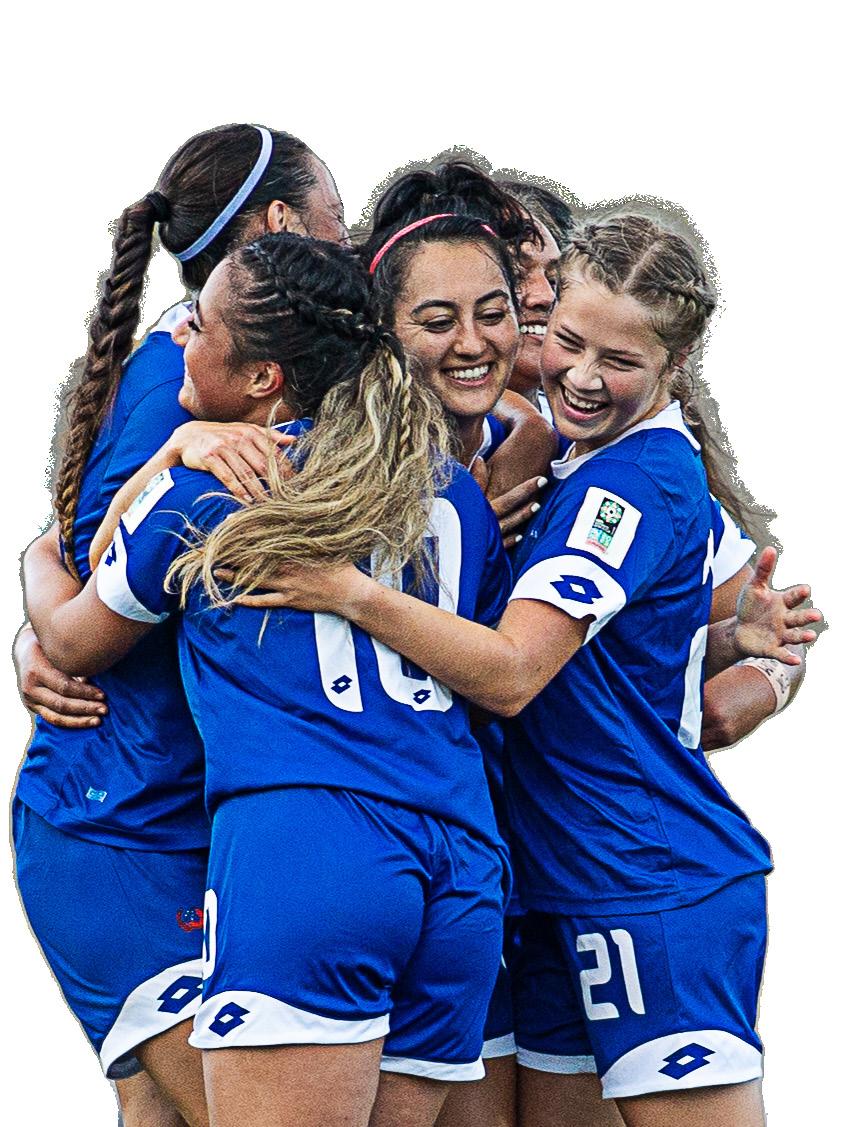
OFC international football burst back into life in March, when our region’s top men’s sides battled for the chance for a place in a World Cup play-off match. New Zealand, Cook Islands, Solomon Islands, Tahiti, New Caledonia, Papua New Guinea, Vanuatu and Fiji traveled to Doha, Qatar. Due to border restrictions OFC was unable to host the tournament in the region.
Favourites New Zealand made it through Group B with three wins, 12 goals scored and only one conceded. Despite losing 1-0 to New Zealand, Papua New Guinea advanced to the semifinals after a tough 2-1 win over Fiji in their last group game.
Group A was unfortunately affected by pandemic-related issues, forcing the withdrawal of the Cook Islands and Vanuatu. This meant the only competitive game was between the Solomon Islands and Tahiti, who both advanced to the semi-finals.
The first semifinal between Papua New Guinea and the Solomons was an instant classic, with the Solomons winning 3-2 to advance to the final against New Zealand who edged a very competitive Tahiti side 1-0.
The Al-Arabi Stadium was the scene for the final, with New Zealand producing a dominant performance in a 5-0 win.
The result sent New Zealand into a playoff FIFA World Cup 2022 Qualifying match against Costa Rica, held in Doha in July which the Central Americans won 1-0.

Our OFC women’s national teams returned to action after a long layoff in May with the Women’s Nations Cup held in Suva, Fiji. The tournament was a great success with large crowds on hand to support the home side and a very even spread of results from start to finish.
Nine teams made for a unique tournament between hosts Fiji, Samoa, Tonga, Papua New Guinea, Cook Islands, Solomon Islands, Tahiti, New Caledonia and Vanuatu.
The group stages proved to be very competitive, with Samoa beating Tonga 2-0 and the Cook Islands 1-0 to top Group A.
Group C saw hosts Fiji draw 1-1 with the Solomon Islands, then beat New Caledonia 3-1 to top the group. The Solomons and New Caledonia drew 2-2, which saw the Solomons advance in second place.
PNG needed a penalty shootout to beat Tonga in the quarter finals while Samoa toppled New Caledonia 4-2, Fiji downed the Cook Islands 2-0 and the Solomons edged Tahiti 1-0.
Fiji defeated the Solomons 3-1 and PNG ousted Samoa 3-0 in the semi-finals.
The stage was set for a memorable final, played in front of a raucous crowd at HBC Park with the visitors PNG prevailing 2-1 to qualify for the FIFA Women’s World Cup Playoff tournament in New Zealand in February 2023.

Another tournament to make its return to the calendar was the OFC Champions League, which culminated in the final eight team tournament held at Ngahue Reserve in Auckland in August.
The competition began with a qualifying tournament and national play-offs in May, aimed to keep travel to a minimum due to the COVID-19 pandemic.
In the qualifiers, Rewa FC beat Lautoka to be Fiji’s representative. Hienghène Sport beat Ne Drehu from New Caledonia, Lae City beat Hekari United in Papua New Guinea, Central Coast beat Warriors in the Solomon Islands, AS Venus beat Pirae in Tahiti and Galaxy FC claimed the Vanuatu spot by beating RueRue. Nikao Sokattak from the Cook Islands and Auckland City advanced directly to the main draw.
As expected, home side Auckland City were a dominant force, scoring 12 goals and only conceding one in their three Group B wins. Hienghène Sport defeated Rewa 2-0 to claim the other semifinal spot from the group, but arguably the biggest cheer went to Nikao Sokattak when they briefly led Auckland 1-0 thanks to a goal from captain Stephen Willis.
Group A was a close one, with AS Venus and Central Coast finishing on six points each, with the Tahitians claiming top spot due to a superior goal difference.
Venus then swept past Hienghène Sport 4-0 in their semifinal, with Auckland beating Central Coast 2-0. Venus and Tahiti national team striker Teaonui Tehau was in fine form, scoring in every match at that point with four goals and a Player of the Match award.
It was a very cool winter’s day at The Home of Football fields for the final, which didn’t stop Auckland City from simply picking up where they’d left off in the previous matches, completing a 3-0 win over AS Venus to clinch their 10th OFC Champions League title.
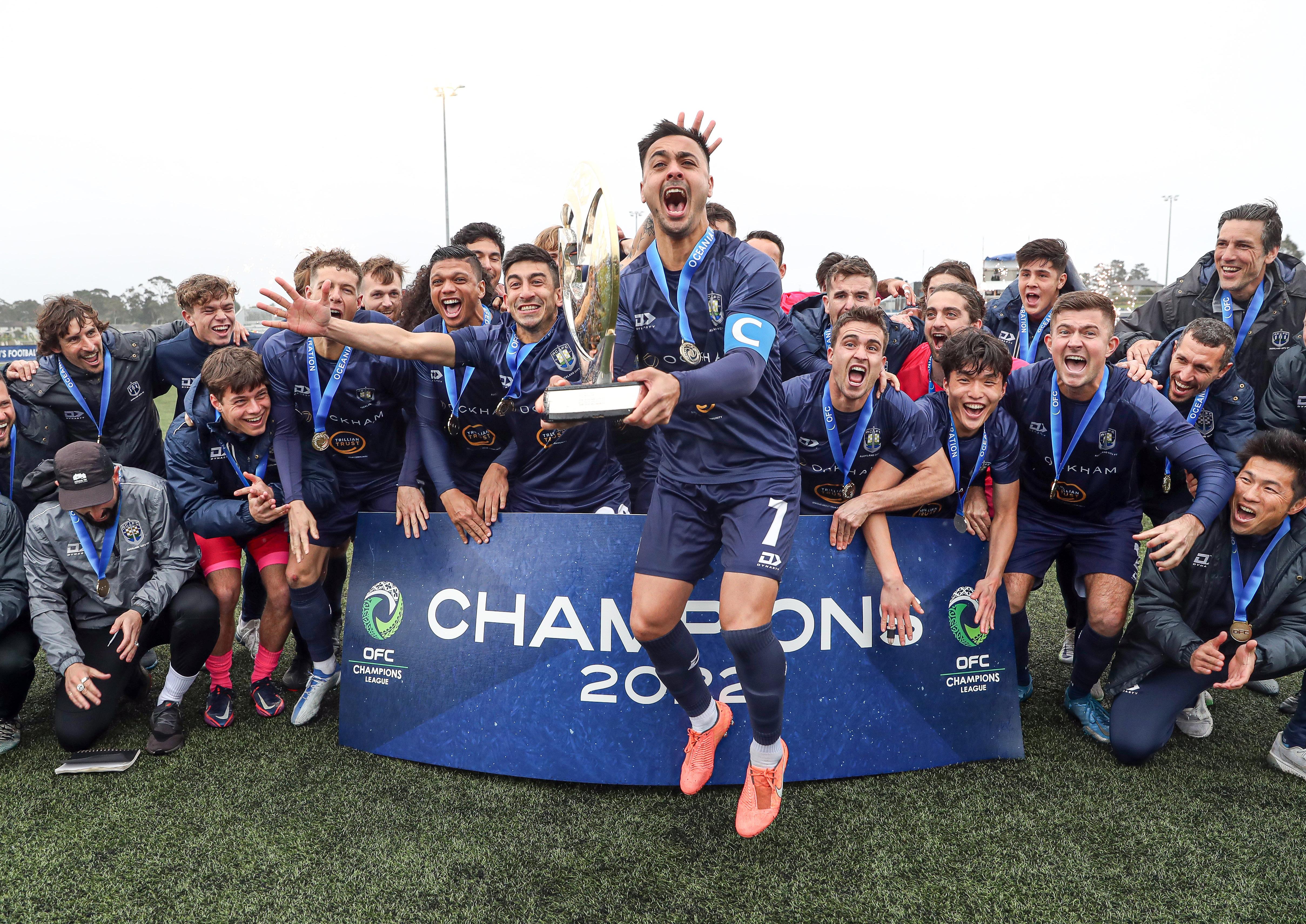
Age grade football returned to the Oceania region with the OFC U-19 Championship 2022, held in Tahiti. 11 Member Associations competed in the first U-19 tournament held since 2018.
New Zealand and Solomon Islands topped Group A, While American Samoa and Cook Islands battled it out for the other group honours, with the Cooks winning 4-0 in their game.
Home nation Tahiti topped Group B, qualifying along with Fiji and Papua New Guinea. Due to the number of sides in the tournament, New Caledonia, Samoa and Vanuatu qualified from Group C.
Tahiti and New Caledonia won tense 1-0 encounters against Vanuatu and New Caledonia respectively, while Fiji ousted Samoa 4-1 New Zealand cruised past PNG 5-0.
The semi-finals took on even more significance, as both winners would automatically qualify for the 2023 FIFA U-20 World Cup. New Zealand completed a 2-0 win over Tahiti and Fiji battled past New Caledonia 1-0.
The final came down to New Zealand against Fiji, both former champions of the U-19 tournament and it was the Kiwis who emerged triumphant with a 3-0 win defending their title from 2018.
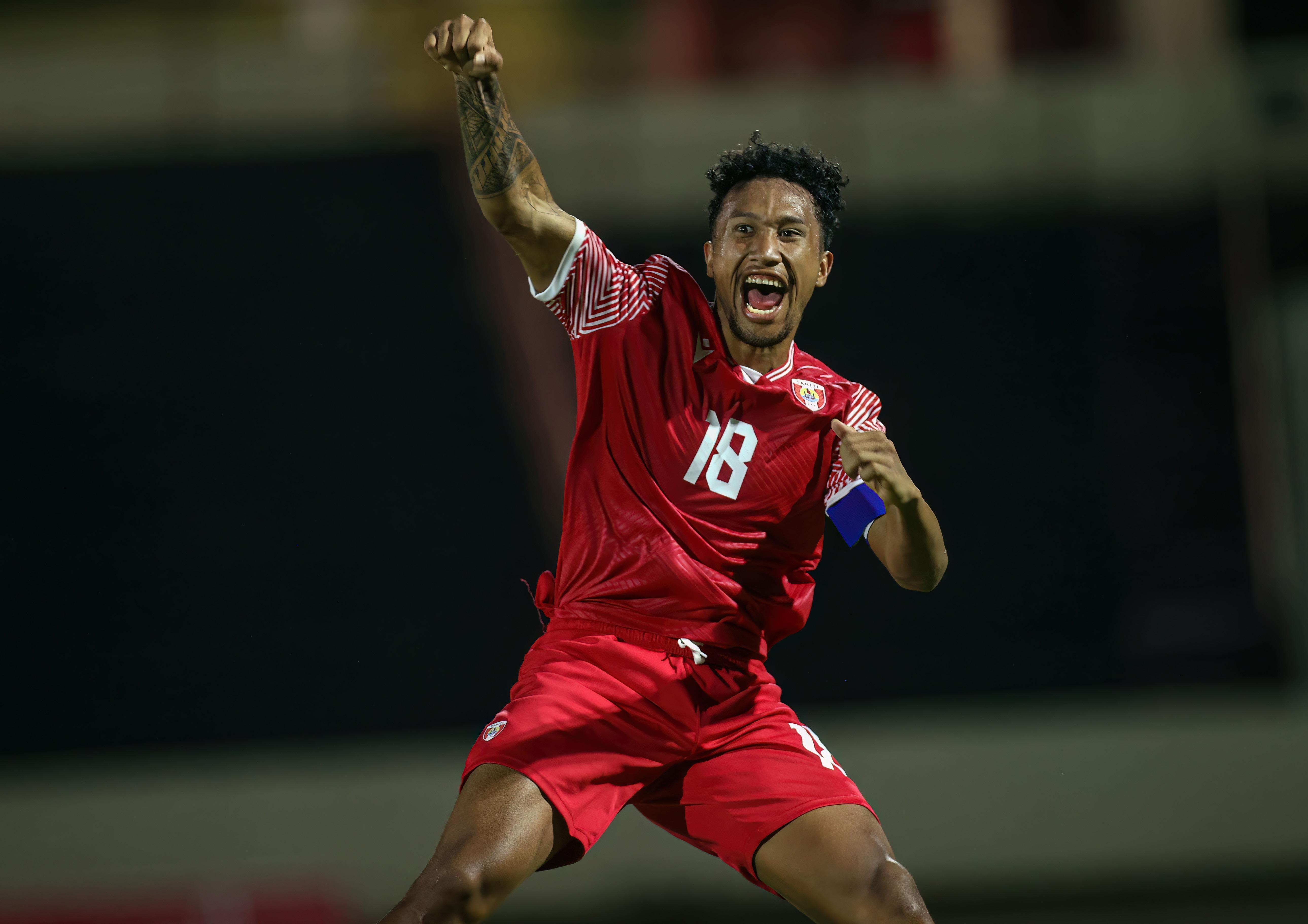
The inter-regional futsal competition made a return in September 2022, the first in three years due to the COVID-19 pandemic.
The schedule was jam-packed with four games played per day (a total of 20 games) at Vodafone Arena in Suva, Fiji. Eight teams competed from Fiji, New Caledonia, New Zealand, Samoa, Solomon Islands, Tonga and Vanuatu.
The Fiji Football Association (FFA) were invited by OFC to enter a second team to participate, the FFA President’s Five, providing an exciting opportunity for the increasing growth of futsal in the host nation.
The group stages were played in a single round-robin format with each team playing their group opponents once. At the end of the group matches, the teams were split into a Cup and Plate section for the knockout stage.
The first match day saw New Zealand overcome a determined FFA President’s Five with three unanswered second half goals to win 5-1 in the opening match of the tournament. Vanuatu impressed in a 9-0 win over Tonga while New Caledonia came from behind to beat Fiji 4-2.
New Caledonia qualified for the Cup semi-finals after a 7-2 win over Samoa while the FFA President’s team defeated Vanuatu 3-2. New Zealand secured their semi-final spot following a big 15-1 win over Tonga. A 6-6 thriller between Fiji and the Solomon Islands saw the Kurukuru claim the last semi-final spot on goal difference.
Vanuatu and Fiji met in the Plate Final with Vanuatu winning 4-3 while New Zealand claimed the overall title after a 6-2 win over the Solomon Islands in the final.
The tournament’s aim was to develop teams ahead of the OFC Futsal Nations Cup 2023, a FIFA World Cup qualifier.

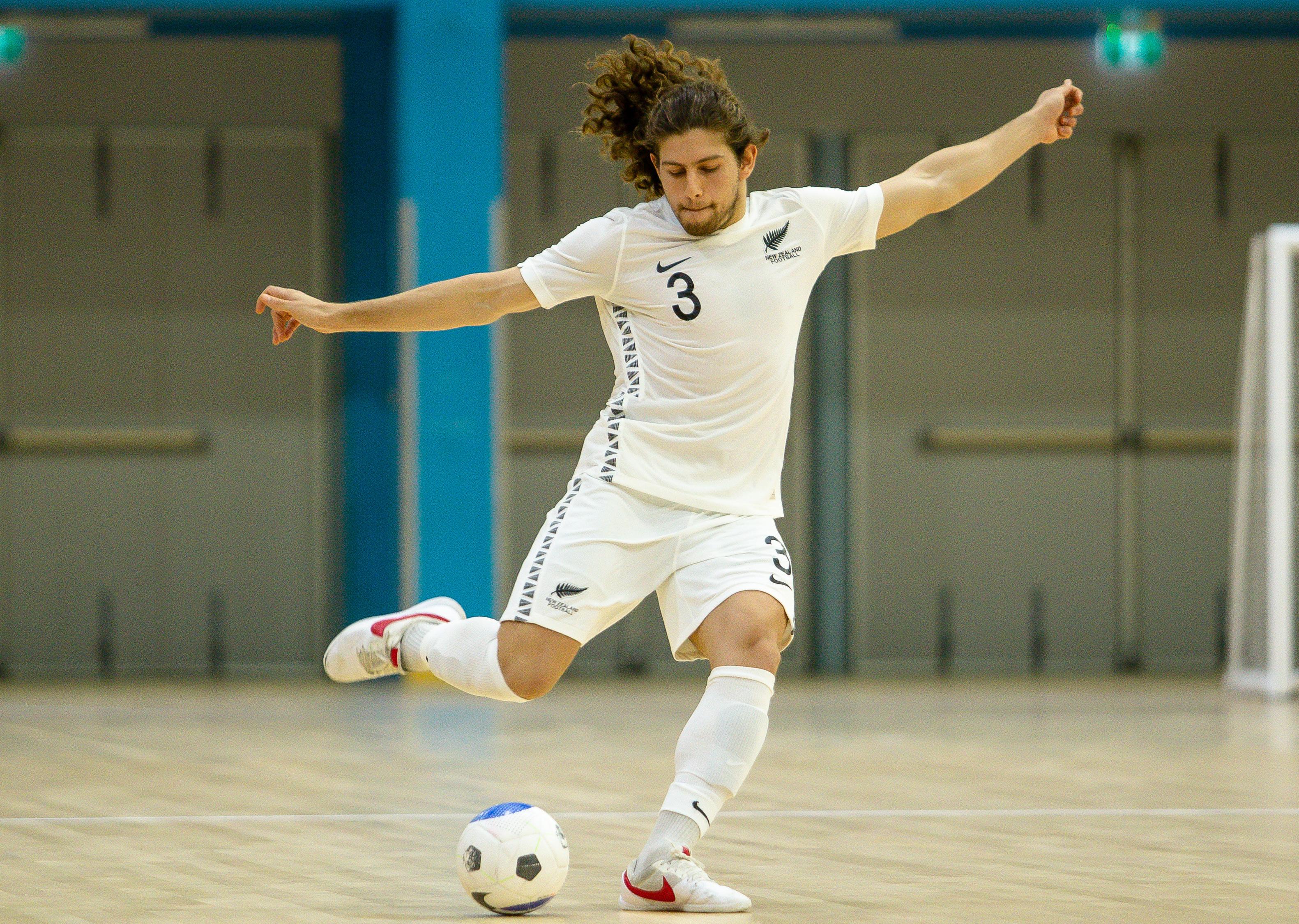
The year focused on operating at an innovative level with the return of OFC competitions in 2022. The mantra of Commercial and Communications was to elevate the branding, broadcast, and media operations at all events and to ensure the promotion of football, people, communities, and culture remained at the highest level.
A turning point in the Commercial strategy was the sale of media rights for the FIFA World Cup – Oceania Qualifiers, the OFC Women’s Nations Cup, and the OFC Champions League. This marked the first time in confederation history that rights were sold and a huge achievement in OFC’s focus to generate revenue.
The OFC Women’s Nations Cup ran from 13 – 30 July and was a huge marketing success. 11,700 new followers were gained across all social media channels, we engaged over 1,000,000 fans. 17 games were broadcasted across 16 Pacific Nations and 26 channels. The tournament was covered by 12 media houses across the region and amassed 105 new stories. The Women’s game made history with over 190,000 viewers on our live streaming platform Eleven Sport. The final between Papua New Guinea and Fiji had 42,000 livestreaming views and a new record crowd of 5,000 plus were in attendance.
Increasing the capability and professionalism of Member Associations continued to be a focus for the Commercial and Communications department, which reshaped its strategy during the COVID-19 pandemic to better suit the current landscape and ensure football is promoted to the highest level across the region. In 2022 OFC tendered, negotiated and purchased TV, Media, Digital and Mobile Journalism kits. The equipment - which included live-streaming kits, photography and video equipment and other key broadcast and media technology, was purchased thanks to generous support from UEFA Assist.
Accompanying the equipment was training and support that included a training session held in Fiji for both in-person and virtual attendance, in which Member
Association Media Officers were taken through how to use and maintain their new equipment.
As part of the OFC’s goal of elevating professionalism in the region and qualifying two teams to the FIFA World Cups in 2026 and 2027, equipment upgrades, and capacity building were identified as key areas of focus.
In addition to that training, the Commercial and Communications Department continued to deliver training modules to Media Officers across the region relating to communications, marketing and social media as well as video and broadcast. The focus was on training Member Associations on how to appropriately report on women’s football, in line with the work being conducted by OFC’s Women’s Football and Social Responsibility arms.
One of the more significant focus areas was the collaboration and contribution to the overall OFC Strategy 2023 – 2026 under the strategic pillars and top goals thus creating a Commercial and Communications strategy in tune with our confederations overall purpose and values.
In summary over the next couple of years, we pledge to focus on
• Developing OFC’s commercial even further and increasing commercial revenue by 10%
• Upskilling Member Association Media Officers to deliver media, broadcast and marketing operations at OFC competitions.
• Implementing marketing and communications framework in all Member Associations, increasing engagement, growing our fan base and promoting Women’s Football at all levels
3 Workshops hosted with our MAs: Implementing broadcasting and live streaming. Writing 101 and Branding & marketing at competitions
1 UEFA Assist and OFC TV, livestreaming and broadcast production Workshop
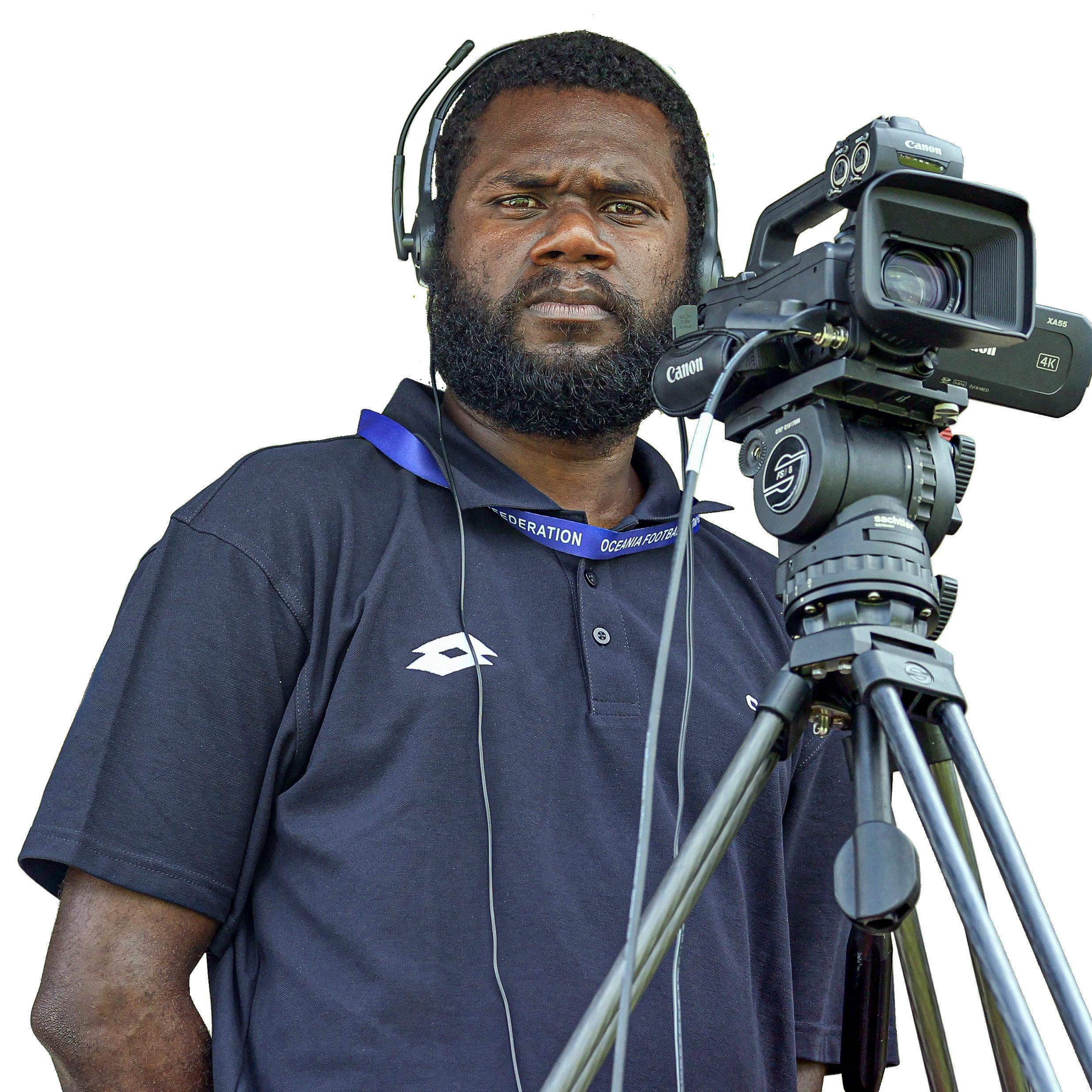
sold for our premium competitions OFC Women’s Nations Cup and OFC Champions League 2022



1.4MIL
LIVESTREAMING VIEWS


1.9MIL IN ENGAGEMENT 55%)
GROWTH IN DIGITAL FOLLOWERS 233,616 (UP 40%)
POST LINK CLICKS 159,948 (UP 18.1%)
Finance and Services continued to strengthen OFC’s foundation for the future and uphold professionalism through strong financial governance in 2022.
Committed to growing in the areas of good financial management and governance, key priorities were achieved this year by Finance, Facilities and Procurement.
The Financial Statements audit for 2021 was completed with unqualified opinion on the independent auditor’s report and the FIFA Central Review 2021 Report produced zero findings.
A new milestone was met with collaboration between OFC Facilities and the FIFA Regional Office, with the launch of the MA Maintenance Programme. This engaged MAs to design their own maintenance framework to best manage their assets.
Another achievement saw the consolidation of the Home of Football Administration and grounds maintenance plan.
For the procurement unit, 2022 focused on strategic thinking which kick started with the development of a sourcing strategy that aimed at shaping procurement needs. This was achieved by analysing budget, historical data and understanding priorities and suppliers.
Moving forward, the Finance and Services Department are committed to capability building by developing the financial and procurement management framework and learning content as a support tool for all Member Associations.

2021 Audit completed with unqualified opinion on independent auditor’s report.
Approved and presented to Congress
Review for 2021 Administration and grounds maintenance plan consolidated

To strengthen the foundation and support to all Member Associations (MAs) is the mantra of Member Associations Services Department (MA Services). The goal is to equip all Member Associations with the right tools, resources and training to achieve excellence in corporate governance and management structure.
The formation of the OFC Executive Programme for the General Secretaries/ CEOs, in consultation with Member Associations General Secretaries and Chief Executive Officers, as outlined in the OFC Strategy 2023-2026, formed a key focus in the 2022 calendar year.
As part of the collaborative-formation approach, a three-day workshop was held at the OFC Home of Football in October, attended by the General Secretaries/Chief Executive Officers from each of the Member Associations. In addition to appearances from special guests including Wellington Phoenix General Manager David Dome, FIFA Chief Women’s Football Officer Sarai Bareman on leadership and performance and UEFA Head of International Relations Eva Pasquier on UEFA Assist, participants shared knowledge and discussion on leadership, performance, personal development, and how to collectively structure the OFC Executive Programme for General Secretaries.
Internally within OFC, the Member Associations Services department worked closely with the Football Division to harmonise our processes for application and reporting of OFC Development Programmes funding. Webinars for General Secretaries, Technical Directors and Finance Managers were held as training support.
Work to assist Member Associations with the OFC Development Programme applications in corporate governance was ongoing, along with supporting Member Associations with funds reconciliation for 2020 and 2021 Development Programmes.
Internally, MA Services acted as support to the organisation working closely with all departments up to the launch of OFC Strategy 2023-2026.
The focus for Member Associations in 2023 will be tied to the launch of the OFC Executive Programme for the General Secretaries/CEOs with five key priorities initially being worked on: Strategic development, Staff management and talent identification, Constructive and positive feedback, organisational growth and the OKR framework (Objectives and key results. Significantly, the OFC Executive Programme is crucial for our ongoing commitment to foster professionalisation across all areas of football and management.
Other priorities for 2023 will be centred around building and implementing a Football Management Certificate which aligns with our strategic pillar of Education and prioritises capability building that meets the needs of not only the individual, but all stakeholders involved.
Ensuring corporate governance is still at the forefront of all we do by finalising the Corporate Management framework. In the long run this will enable all Member Associations to adopt a corporate management and competition operations framework.
1 Workshop held with all 11 General Secretaries/ Chief Executive Officers in attendance
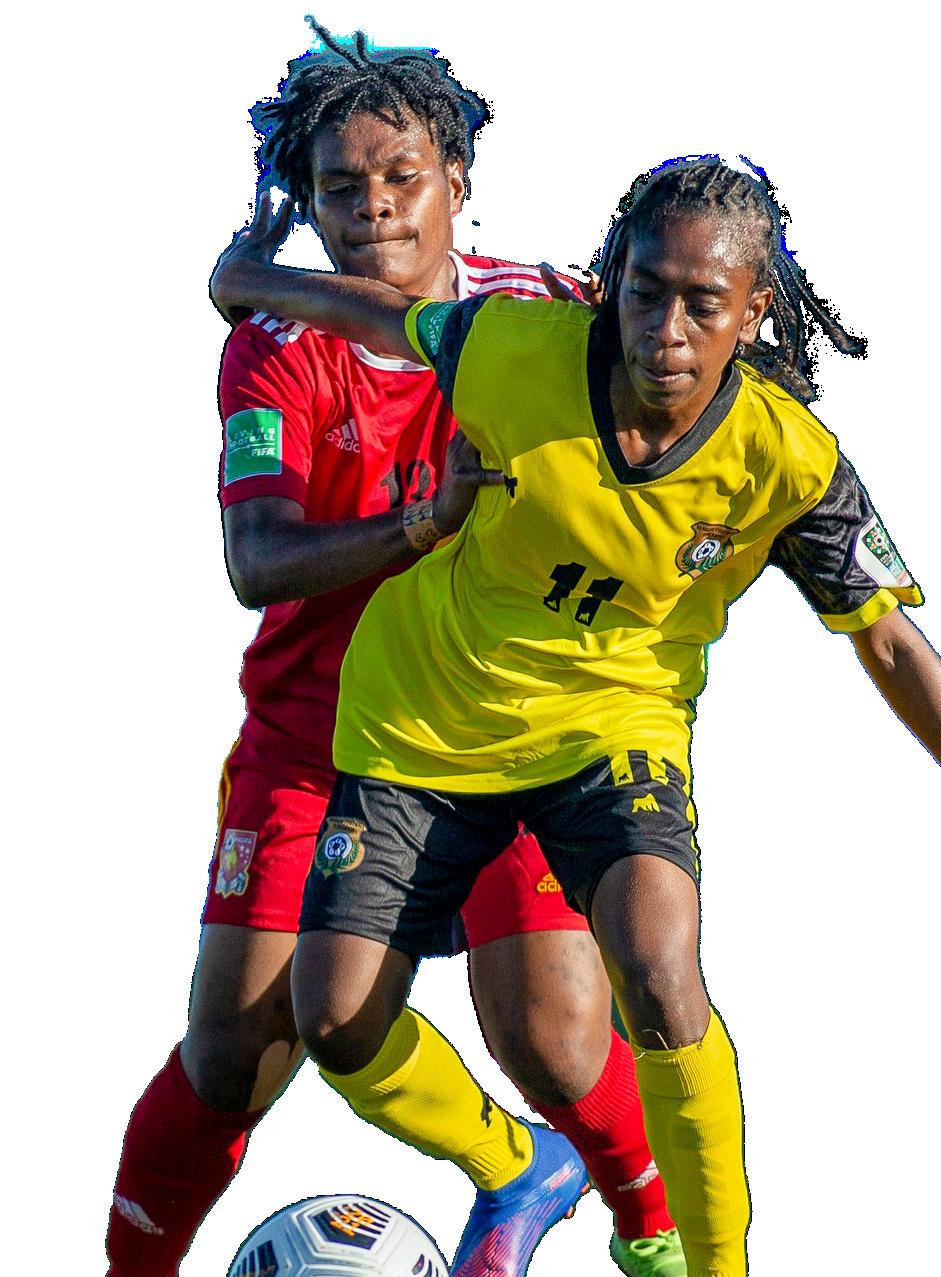
Launched and presented to the OFC Congress 2022


Last year presented a chance for the OFC Legal and Compliance Department to reconnect in person with Member Associations and resume attending international meetings, which play a crucial role in ensuring the OFC and its Member Associations remain part of key conversations and developments in the space of Legal and Compliance and Good Governance matters.
In April 2022, Member Associations from across Oceania joined integrity experts from FIFA and the United Nations Office on Drugs and Crime (UNODC) for the opening of the latest edition of the FIFA Global Integrity Programme. In line with FIFA’s overall vision of making football truly global and its ongoing commitment to protecting and promoting the integrity of the game, the FIFA Global Integrity Programme, developed in collaboration with UNODC, aims to improve education and build integrity capacity in the 11 Member Associations.
The Programme consisted of three modules designed to share knowledge and discuss best practices with Integrity Officers from across Oceania focussing on key topics, including establishing an integrity initiative, reporting mechanisms, competition protection, media strategy, cooperation between stakeholders, best practices and investigations. The Programme was a great experience in continuing OFC’s commitment to protecting and promoting the integrity of the game.
The fourth annual FIFA Compliance Summit held in September in Costa Rica offered a valuable learning opportunity, and a chance to contribute ideas, for OFC and representatives from Member Associations. The theme
of the Summit was Beyond Best Practice, inviting participants to look at compliance in a different way and reflect on how to expand best practice policy so it is embedded as a shared mindset and culture.
In addition to the OFC Legal and Compliance Department, representatives from six OFC Member Associations – Vanuatu Football Federation, Tonga Football Association, Cook Islands Football Association, New Zealand Football, Fiji Football Association and Fédération Tahitienne de Football –attended the Summit.
Towards the end of the year eight independent members from across the OFC Appeals Committee and OFC Disciplinary and Ethics Committee connected in person for the FIFA/OFC Judicial Bodies Workshop. The OFC Judicial Bodies are comprised of the OFC Appeals Committee and the OFC Disciplinary and Ethics Committee. The OFC Judicial bodies are instrumental in ensuring OFC is held accountable for administrative decisions and are responsible for upholding the principles of integrity and fairness by applying the OFC Statues, OFC Code of Ethics and the OFC Disciplinary Code.
The workshop was split into three sessions: a presentation of FIFA and OFC’s Judicial Bodies and their respective secretariats, procedural aspects, and general principles of the proceedings, before the judicial bodies and general principles of appeals before the Court of Arbitration for Sport and the Swiss Federal Tribunal Case law.
The one-day event was facilitated by representatives of the FIFA Judicial Bodies (Adjudicatory) and the OFC Head of Legal and Compliance, Farah Mohammed.
The purpose of the workshop was to connect and reinforce the importance of the decisions made by the members and the direct impact their decisions have on upholding integrity in the OFC region. While cases differ based on the specific facts and circumstances of the matter, the regulations applied are the same which are underpinned by overarching legal principles.
Therefore, consistency across decision making reinforces the natural justice principles of fairness and transparency, further enhancing and developing the way football is governed in the OFC region.
Throughout next year, OFC has committed as part of the 2023 – 2026 strategy to focus on finalising the Match Integrity Modules to prioritise the implementation of the Match Integrity Progamme within our Member Associations, A testament to OFC’s commitment to good governance and professional development of officials, management and players.


FIFA FORWARD 2.0
FIFA COVID 19 RELIEF PLAN

2022 marked the conclusion of the FIFA Forward 2.0 cycle between 2019 and 2022.
Under the two iterations of FIFA Forward (2016 – 2022), a total of 201 million USD was made available to Oceania. This included funding to Member Associations and the confederation.
A total of USD 33.8m, USD has been invested in specific projects, out of an entitlement of 46.8m USD.
Since 2016, all 11 Member Associations have committed a total of 19.6m USD of Forward Funds on 40 infrastructure projects.
The FIFA Regional Development Office was strengthened with the appointments of two Regional Office Development Coordinators who joined the office in February and who bring a wealth of knowledge and experience to the team.
FIFA Forward Funds have enabled Member Associations to increase the scope of their investments across their entire football ecosystem– making football truly global.
There has been a strengthening and improving of domestic competitions, supporting other football stakeholders through subvention projects, supporting national teams’ preparations and participation at regional
and global competitions, and investments in fit-for-purpose infrastructure projects.
Under FIFA Forward, major infrastructure projects have been and are being constructed,
The FIFA Forward Programme plays a key role in promoting football development globally, which is one of the central pillars of The Vision 20202023, as laid out by FIFA President.
Work on the Samoa, Apia Park Football Complex (2.5m USD) commenced in 2021. It includes a futsal court, office and technical spaces, 2 natural pitches, and carparks. It’s currently 80% complete and due to be finished in late 2023.
PNG, Kimbe Technical Centre (554,000 USD), Lae Technical Centre (443,000 USD), PNGFA HQ Renovation (499,000 USD): projects continued in 2022 and due for completion in 2023. The work on the technical centres focused on renovating and upgrading existing facilities to ensure they are fit for purpose to best serve the regions where they are situated. The HQ project includes the renovation and upgrading of the facility to provide the best environment for the secretariat staff and additionally for operational and competition spaces for match day operations at the venue.
Tonga, TFA Stadium and Football Complex (3.6m USD). Tonga Football Association commenced on this major infrastructure project in 2022. This boutique facility incorporates a 500 seated grandstand, solar powered
floodlights, changing rooms for athletes, medical/doping rooms, and a conference area. More importantly, this infrastructure has been engineered to be one of the strongest constructed sporting facilities in Oceania.
Vanuatu, Freshwater Stadium (4.1m USD): This project was conceptualised by the Member Association and managed by a highly experienced local firm Qualao Consultants, under the oversight of Vanuatu Football Federation led by Alick Terry who is an experienced project manager. It was constructed by local companies during the pandemic who were able to navigate through the difficult period of the pandemic. It was completed and the handover ceremony was held in December 2022.
Fiji Suva Gym (240,000 USD): This project entailed the construction of a brand-new facility to be utilised by the MA to support its national teams programme and also generate revenue for the MA by opening to the general public.
The FIFA Regional Office have continued collaborating with the OFC on several initiatives. The MA Maintenance Programme was launched with support and expertise from the OFC Facility Manager, FIFA Consultant and the regional office. This engaged Member Associations to design their own maintenance framework to best manage their assets.
Member Association Statutes Revisions continue for a number of Member Association in Oceania. Led by the MA Division Governance Team (Rolf Tanner) and the OFC Head of Legal and Compliance (Farah Mohammed) with the strong support of the FRO.
FIFA+ commenced with 2 Member Associations (Solomon Islands, Fiji) signing up to this platform. FIFA+ is a brand-new FIFA digital initiative designed to help democratise the game and bring many benefits to our Member Associations.
Football for Schools Commenced in the region with the first launch held in Tonga. It was attended by Scott Woodford from Auckland’s FRO with the lead coordinators from F4S, Antonio Sanchez and Alexandra Ramos. Furthermore, Yakubu Ayegbini a FIFA Legend also returned to Tonga for another assist in launching the project in the country.


The impact of the Covid-19 pandemic has had an impact on football across Oceania since 2020. OFC only started to see this impact lessen in the second part of 2022 when border restrictions begun to be lifted in some Member Associations.
FIFA’s ground-breaking COVID-19 Relief plan as part of their vision of unity, solidarity and mutual understanding provided USD$2 million to OFC in support of OFC’s 11 Ordinary members.
This helped greatly in alleviating the financial impact caused by the pandemic.









